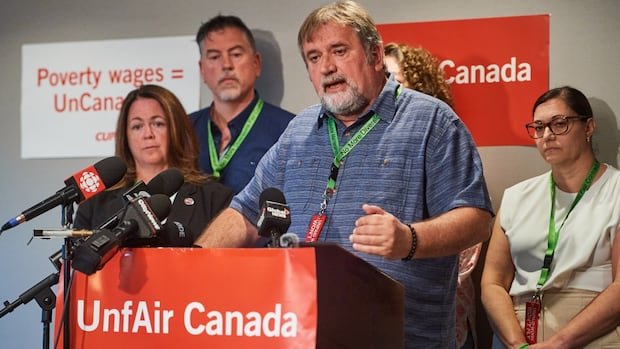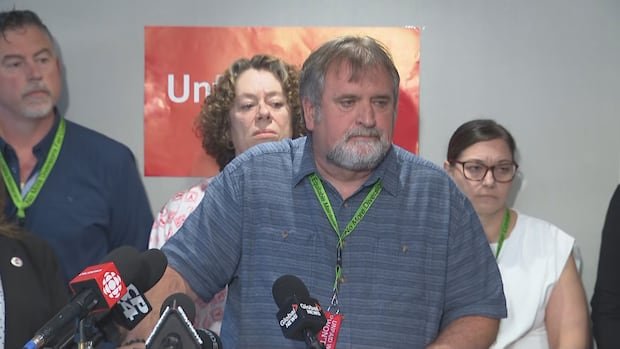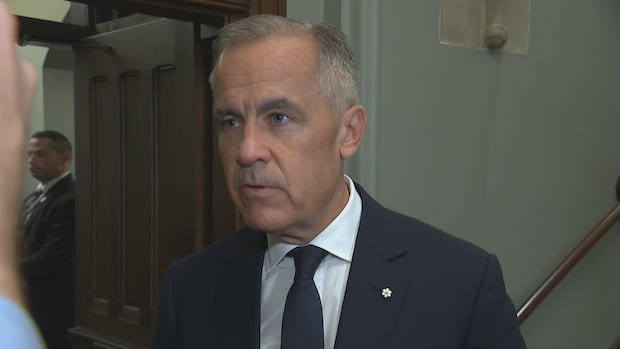The union representing thousands of striking Air Canada flight attendants says it will risk jail time and fees but will not order its members back to work, despite the federal labour relations board calling the strike illegal.
“We will not be returning to the skies this afternoon,” Canadian Union of Public Employees (CUPE) national president Mark Hancock said at a news conference on Monday.
“If it means folks like me going to jail, then so be it. If it means our union being fined, then so be it.”
In a decision released Monday morning, the Canada Industrial Relations Board (CIRB) said the union’s defiance of a back-to-work order is “unlawful.”
It called on the union to “cease all activities that declare or authorize an unlawful strike of its members and to direct the members of the bargaining unit to resume the performance of their duties” by noon.
The directive, written by CIRB vice-chairperson Jennifer Webster, also calls on the some 10,000 flight attendants themselves to resume their duties “immediately.”
Failure to comply with the board’s orders can result in significant fines and penalties.
Despite that, Hancock made it clear that workers will remain on the picket lines.
“None of us want to be in defiance of the law,” he told reporters. “As we’ve said repeatedly, we’re going to stay committed to those workers.”
Mark Hancock, president of the union representing striking Air Canada flight attendants, says there is ‘no limit’ to what he is willing to do to get a fair deal for workers after the federal labour relations board called the strike illegal.
The decision comes after a hearing on Sunday and a frazzled weekend for travellers.
Flight attendants walked off the job early Saturday morning, leading to hundreds of flights being grounded. Less than 12 hours after the strike and lockout took effect, Ottawa intervened.
Federal Jobs Minister Patty Hajdu invoked the contentious Section 107 of the Canada Labour Code, asking the CIRB to send the two sides to binding arbitration and to order the airline and its flight attendants back to work in the meantime to “maintain or secure industrial peace.”
Air Canada says it hopes service returns ASAP
Air Canada announced early Sunday that it planned to resume flights, but just hours later, the union said in a statement that its members would remain on strike, defying the back-to-work order handed down by the CIRB.
CUPE has accused the Liberal government of “rewarding Air Canada’s refusal to negotiate fairly by giving them exactly what they wanted.”
Prime Minister Mark Carney said flight attendants should be ‘compensated equitably’ and that it’s ‘disappointing’ that negotiations did not lead to an agreement as the Air Canada strike continues.
In a statement following the CIRB directive, Air Canada said it estimates 500,000 customers’ flights have been cancelled as a result.
“Air Canada regrets this impact on its customers and is fully committed to returning to service as soon as possible,” the airline said.
On Monday, Prime Minister Mark Carney said it’s important that flight attendants are “compensated equitably at all times” and called for quick resolution.
“It was the judgment of both the union and the company that they were at an impasse. That’s not my judgment, that’s their judgment,” Carney said. “So … we are in a situation where literally hundreds of thousands of Canadians and visitors to our country are being disrupted by this action.”
He suggested Hajdu will have more to say.
Unpaid work a key sticking point
Air Canada and CUPE have been negotiating a new contract for flight attendants after the previous 10-year contract expired in March.
Among the chief sticking points are wages and “ground pay,” which covers the work that flight attendants do before a flight takes off and after deplaning.
According to CUPE, many duties performed by flight attendants prior to boarding and after deplaning, including performing required safety checks and assisting passengers, go unpaid under the current pay structure.
It says the airline proposed ground pay at 50 per cent of a flight attendant’s hourly rate. The union has been pushing for ground work to be paid at 100 per cent.
Air Canada has said publicly that its proposal includes an eight per cent increase in hourly wages in the first year, plus another four to eight per cent bump based on a new ground pay formula.
Under the proposal, the airline says, senior flight attendants would earn $87,000 annually on average by 2027.
CIRB is an independent tribunal that hears and decides labour and employment complaints in federally regulated workplaces. It’s set up to function like a less formal court.
However, labour unions challenging Section 107 have argued the board has not been acting independently.
Chris Roberts, director of social and economic policy at the Canadian Labour Congress, said the board is “not simply the stenographer for the government.”
“The government can’t simply tell the board to do things because the board is an independent tribunal that has responsibility for interpreting the statute,” he said in an interview last week.
The employers’ association Federally Regulated Employers – Transportation and Communications (FETCO) criticized CUPE’s actions and accused it of “normalizing the idea that if you don’t like a decision, you can simply ignore it.”
“That is not labour relations, it’s a reckless path that erodes trust in the labour relations system, weakens our global reputation and undermines economic stability at a moment of heightened geopolitical uncertainty,” said president Daniel Safayeni in a statement.



